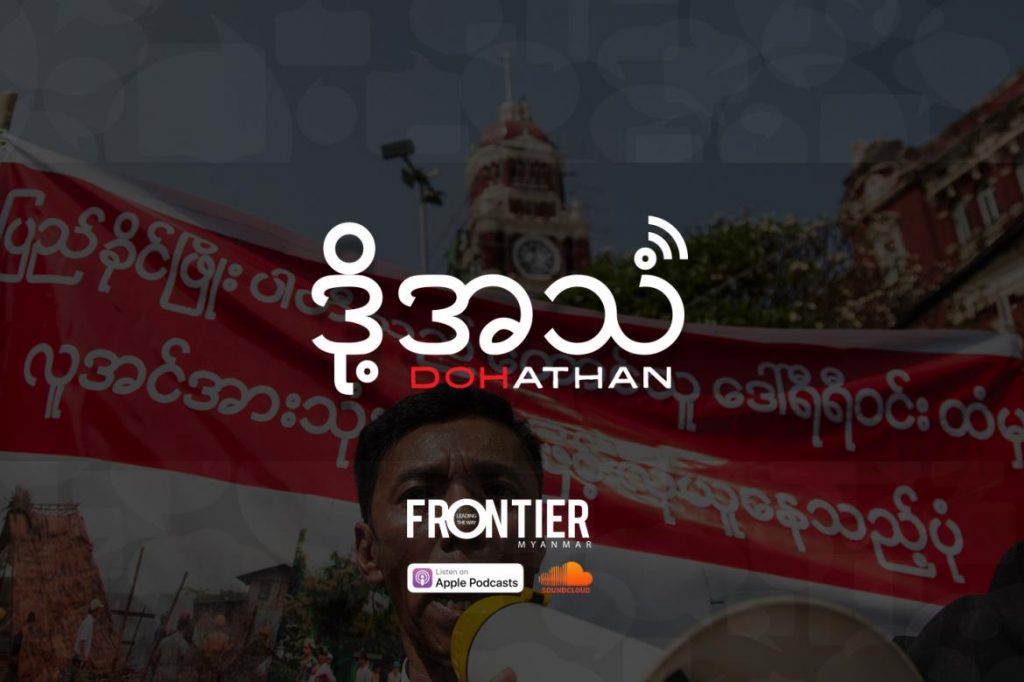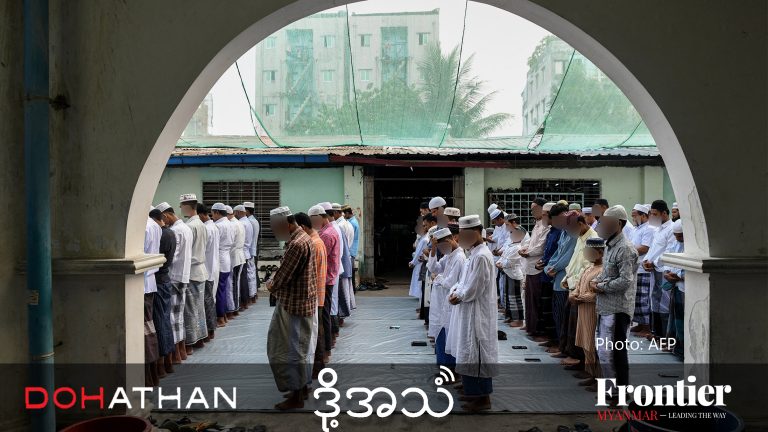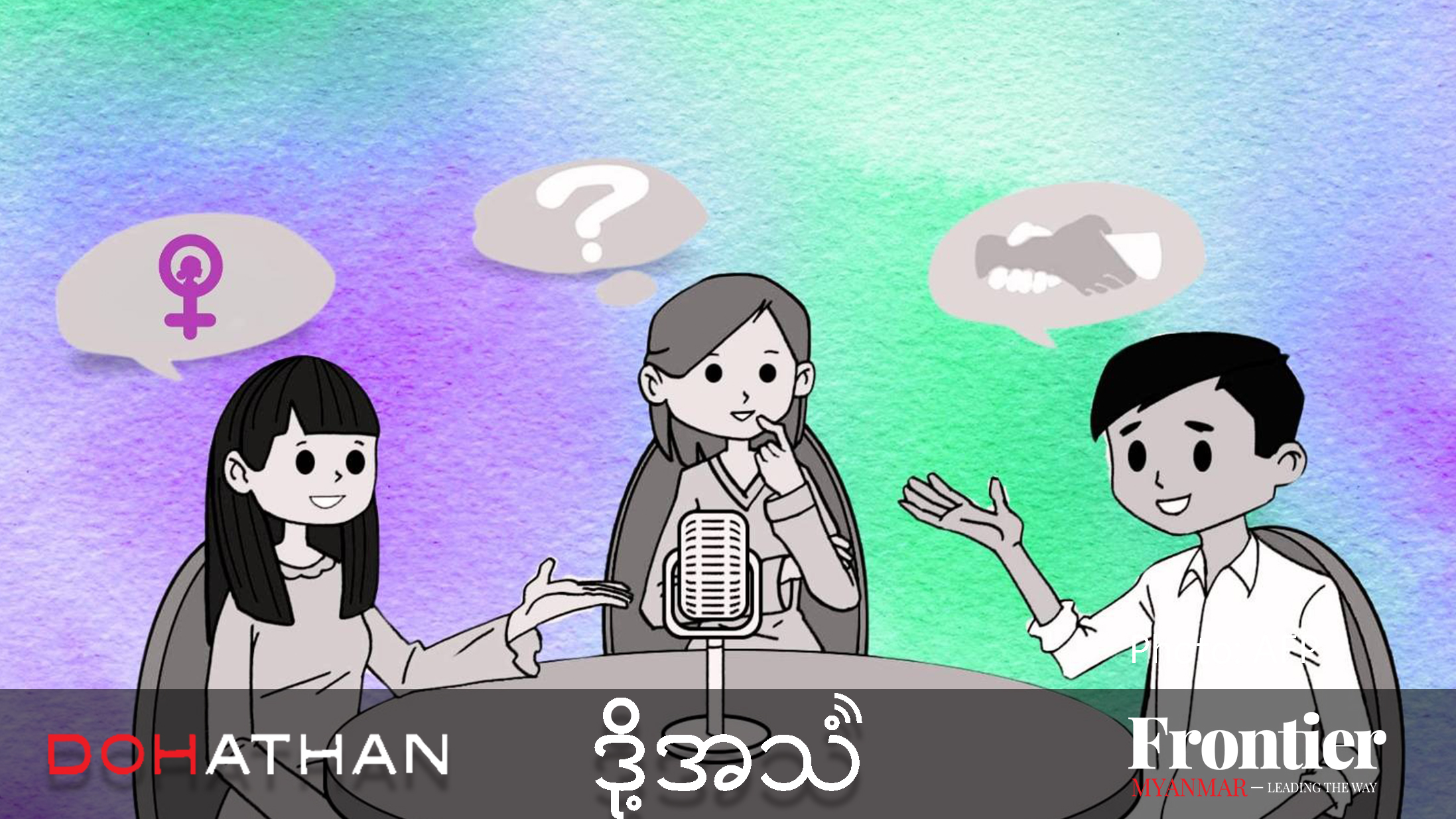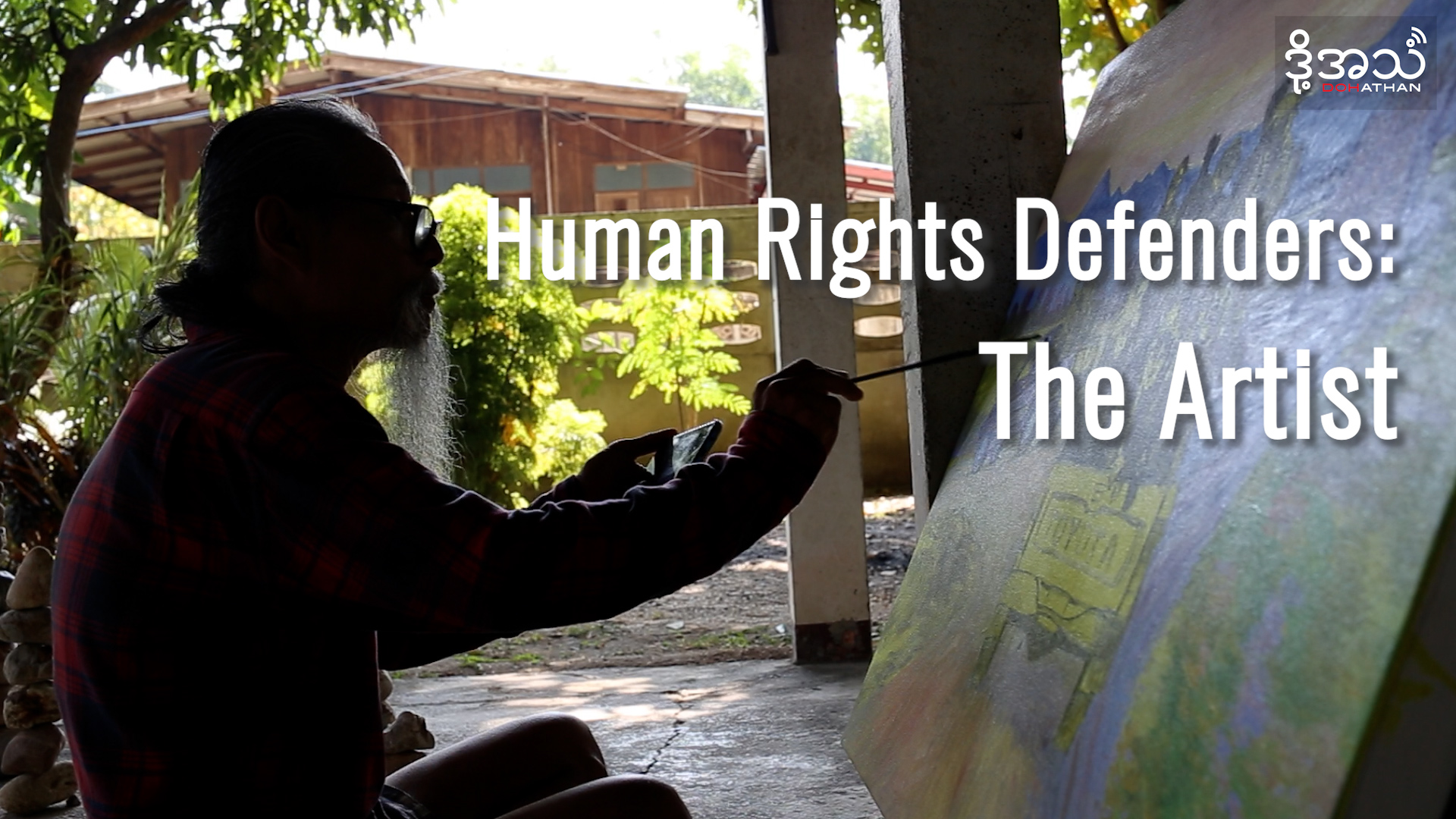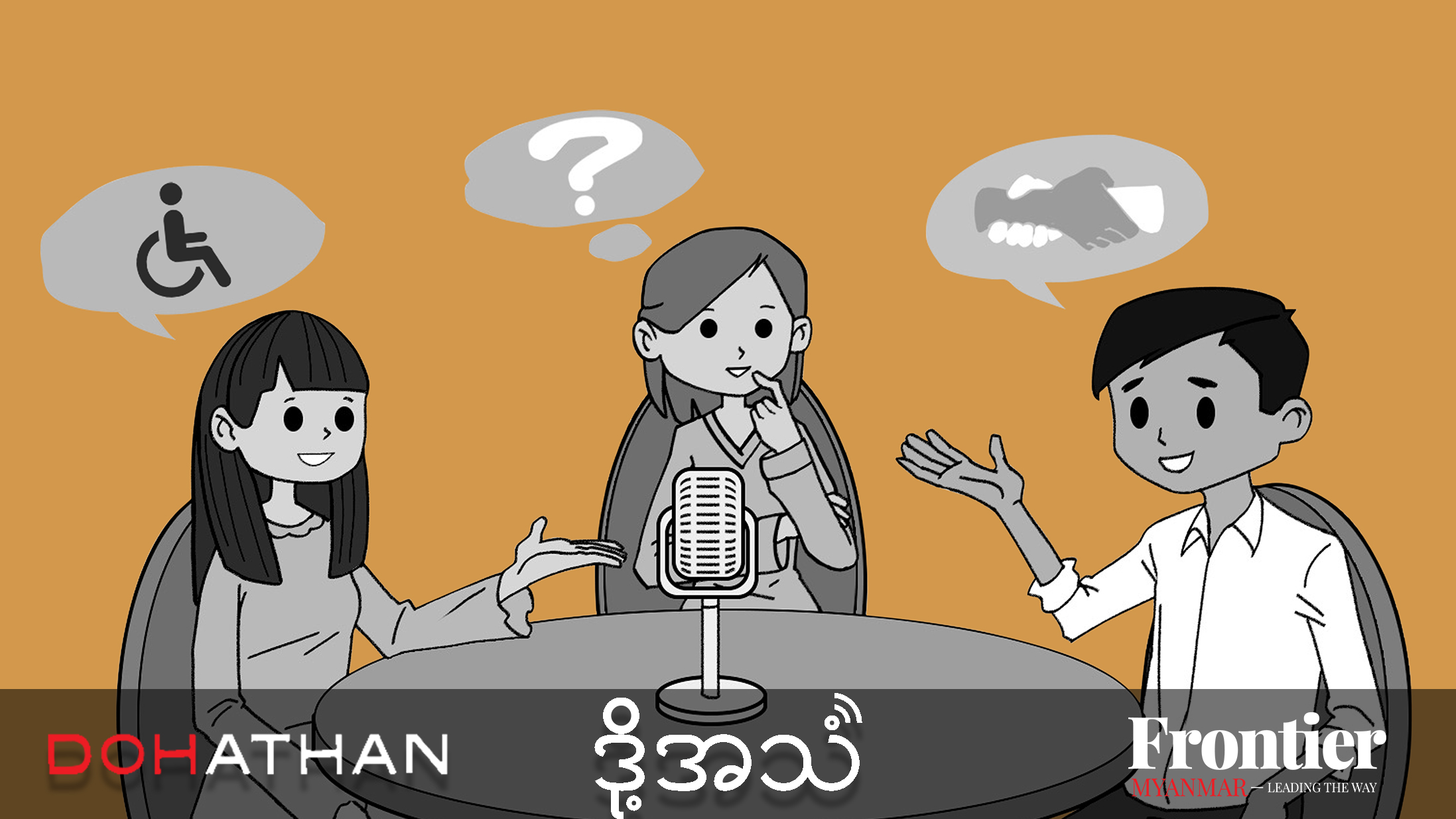Mingalabar, welcome to the second edition of Doh Athan.
For those who listened to our first episode last week, we thank you for your support.
As we approach the second anniversary of the National League for Democracy’s historic election victory in November 2015, Doh Athan will this week look at whether human rights for people in Myanmar have changed for better or worse in the past two years. We will again hear the views of the public and human rights experts in Myanmar and look at Myanmar’s chequered history on human rights. Click the links below to listen on either Soundcloud or YouTube.
English transcript
Win Zarni Aung: Mingalabar, welcome to Doh Athan, a new weekly human rights podcast from Frontier Myanmar, I am Zar Ni.
Support more independent journalism like this. Sign up to be a Frontier member.
Our pioneering audio programme, the first of its kind in Myanmar, gives us the opportunity to shine a spotlight on and speak to many voices about human rights issues that affect people across the beautiful country.
For those of you who listened to our first episode last week, we thank you for your support.
As we approach the second anniversary of the National League for Democracy’s historic election victory in November 2015, Doh Ahthan will this week look at whether human rights for people in Myanmar have changed for better or worse in the past two years.
In our second episode we will again hear opinions among public and the views of human rights experts in Myanmar to help answer this question
Myanmar’s record on human rights has been chequered since it signed the UN’s Universal Declaration of Human Rights in 1948 — a record often cited as one of the worst on earth.
Between 1962 and 2011, Myanmar’s people suffered many well-documented human rights abuses under the country’s former military regime.
After the end of military junta there were some improvements. During the Thein Sein administration, many political prisoners were released.
It was hoped things would improve further when the NLD swept to power under its “Time for Change” slogan in Myanmar’s 2015 elections.
Daw Suu promised her NLD government would protect the rights of Myanmar citizens.
But the humanitarian crisis unfolding in Rakhine has cast doubt on this and it remains to be seen whether human rights in all issues across the country have changed in the past two years.
Doh Athan asked a number of people that question.
Ma Sel Sel: “It could be better if they do in reality what they said. I want their words to be permanent. We cannot do anything in this situation. As an adult, they should keep their words believable. If it might not happen in reality, the loss will not for only a person. As she is the national leader, the failure will affect all citizens if it might not work well. If it comes true, it will be the best. I hope the government will endeavour to implement their promises in reality.”
Ko Nyi Nyi: “I think they don’t perform this part currently. We have not seen anything that is protecting and guarding the people. We keep watching the government.”
Daw Helema: “As the government just recently began to rule our country, we have to watch if it might be good or bad. According to their performances, there might be the good or bad thing for our people. They can’t give the citizens full coverage of human rights overnight due to the period when they are governing. We have to watch them. It can’t be possible quickly if we want something good to come. In a house, even the family members are not the same. The country will turn good or bad depending on their governance. We pray for it to get better.”
Win Zar Ni Aung: It is clear that there is hope among people that rights for people in Myanmar will change for the better but things will take time.
So what to the experts think of the NLD’s performance on human rights?
Nan Phyu Phyu Lin, the national advisor of the Gender Equality Network, explains:
“There are many committees in parliament within the NLD Government. Especially, Women and Children’s Development Committee, Ethnic Affairs and Public Affairs committees. Besides, the National Women’s Affairs Committee was reconstituted to promote women’s voices in 2016.”
They discussed the Child Law and Disabilities Law in Parliament. They held meetings for Prevention and Protection of Violence Against Women Bill. There will be a human rights campaign from November 15 to December 10. For these reasons, I think human rights have improved within new government. On the other hand, we are facing the Telecommunications Law, Section 66d, which is the opposite of freedom of expression. Human Rights and legal procedures still need to overcome this block.”
Daw Nyo Nyo Thin, a former member of Yangon Region Hluttaw, believes changes to human rights have been mixed in the past two years.
“Human rights standards improved, but in some cases it was worse than ever before under the NLD government. Party leaders have limited the freedom of expression of their MPs. Even though they upload their opinions on Facebook, they are recorded and reprimanded. This is bad for the country. As they confined the freedom of expression of MPs, there will be a question of the standard of democracy in our country. Beside, they can’t withdraw 100 antidemocratic laws that people hope to rescind. It is a question for the parliament. Parliamentary action needs to make the government more accountable. But, citizens can talk about their rights more freely than before.”
Cherry Zahau, a Yangon-based human rights activist, agrees that there have been some improvements:
“There is no point showing the improvement of human rights with reference to the NLD government. For example, we saw many cases under 66d, the Telecommunications Law. We worry these cases are threatening the freedom of expression or are abuse of the law. Besides, civil wars are continuing in ethic areas. It is breaking not only the human rights but also education, security, health and social rights in this conflict area. In Rakhine state, within one month, there are almost 500,000 Rohingya who fled to Bangladesh, the same as the population of Chin State. I consider human rights are on the decline because of all these reasons, But we can not blame only the NLD Government.”
U Win Mra, chairman of the Myanmar National Human Rights Commission, defended the Government’s approach to human rights:
“As they are the democratic government, they are working to improve the way of democracy. Democratic reform had already started during the former presidency of U Thein Sein. We now see the members of NLD eager to promote the human rights because they have already suffered from the violating of human rights. For example, human rights are abused in prison. In the past, the prisons don’t cooperate with the MNHRC .But after that, they accept negotiations. When they check the prison, they saw the prisoners living in an overcrowded environment. When they consult about that they started to transform the situation. And now, the prisoners can live more comfortably than before. These are the obvious changes.”
Mr Nickey Diamond of human rights organisation Fortify Rights said violations have increased since 2015:
“I feel there are more violations of human rights under this government. Especially in Kachin and Shan states. But some sectors have improved their human rights. For example, there was a total repression of the media sector before 2010. With the democratic transition, there is now freedom of expression in media. But we face 66d charges if criticise the NLD or military on social media. We saw some of the sector of human rights is improving, some are normal and some are getting worse.”
Win Zar Ni Aung: It is clear to see, as we discussed last week, that human rights is an extremely complex and far reaching issue that cannot be solved overnight.
In some cases improvements have been made in the past two years but others have taken a step backwards.
Now we will round up some of the human rights stories currently affecting Myanmar.
Buddhist Protest in Rakhine
Hundreds of hardline Buddhists have protested against a plan by Myanmar’s government for hundreds of thousands of Muslim refugees to return to the country.
More than 600,000 people from the community — who identify as Rohingya — have fled to Bangladesh since August following a clearance operation by Myanmar’s military.
The refugees say some have been killed and raped and their villages set on fire in Rakhine State, with the United Nations describing their treatment as a “textbook example” of ethnic cleansing.
Daw Aung San Suu Kyi said her government was holding talks with Bangladesh about their return but they would need to prove they were Myanmar residents and few are thought to have the relevant documents.
The Buddhist protest took place in the state capital, Sittwe, where many Rohingya lived before they were forced to flee the violence, and activists at the march urged the government not to repatriate them.
Aung Htay, an organiser of the demonstration, said: “If these people don’t have the right to be citizens … the government’s plan for a conflict-free zone will never be implemented.”
Myanmar does not recognise the Rohingya as an ethnic group and insists they are Bengali migrants from Bangladesh living in Myanmar illegally.
Minimum wage
The battle over changes to the national daily minimum wage intensified last week after Myanmar’s largest workers union called for it to be increased to K6,600.
The Confederation of Trade Unions in Myanmar said the increase was needed to help people keep up with the rising cost of living.
But some businessmen have warned that a minimum wage of K4800 could lead to closures of some businesses.
U Win Zaw, a CTUM executive member, said: “According to our survey, information and strategy, K6600 must be set up as the minimum wages in order to cover the daily cost of living of workers.”
The country’s daily minimum wages, which was set in August 2015, was pegged at K3,600 or K450 per hour.
Union Labour Minister U Thein Swe said state and regional committees have proposed the new minimum wages to be between K4,000 and K4,800 during a meeting of the National Committee for New Minimum Wages held on October 2.
A recent CTUM survey revealed a worker in Yangon has to spend at least K5634 per day, while workers from the Sagaing region needs K4690 daily to satisfy his or her daily needs.
Sexual predator
Authorities are hunting a sexual predator who asked young girls to offer their virginity to him by taking advantage of religious beliefs.
The 25-year-old suspect, known by the names of Khun Ton and Zat Lite, allegedly claimed to be a reincarnation of Alan Tayar Sadayaw, a monk highly revered in Mon State’s Thaton Township.
Union Minister for Religious Affairs and Culture Thura U Aung Ko has vowed the man will be brought to justice.
“Such things should not be happening today. It is very disgusting. We will work together with the Mon State government. Actions will be taken,” he told reporters after a Pyithu Hluttaw meeting last Thursday.
“The problem is he has too many supporters. Pa-o ethnics from all parts of the country come here. Parents themselves agree and let their daughters who are virgins sleep with him. It is hard to take action because no one has complained,” she said.
Pa-o Ethnic Affairs Minister Daw Nan San Wint Khine said the regional government would also file cases against the suspect.
The Human Rights committee of the state government also accepted a complaint letter against the man and the committee is already investigating.
Immunisation
The government is extending its national immunisation programme to help combat deadly infectious diseases in Myanmar.
Between 80 and 90 percent people in the country currently receive vaccines but tens of thousands of people are still not protected.
Health experts warned that children who were not fully vaccinated cannot be 100 per cent immune to infectious diseases.
The health ministry has confirmed three new vaccines will be included in its annual vaccination campaign in 2018. These are the vaccines against Japanese Encephalitis, vaccine against rotavirus causing diarrhea and the vaccine against the Human Papilloma Virus (HPV) causing cervical cancer.
We hope you enjoyed the second edition of Doh Athan.
This programme was put together this week by Zar Ni and AHtet.
You can read the above-mentioned news and other interesting articles via Frontier Myanmar’s website and Facebook pages and you can share your thoughts on these pages freely.
Please stay tuned for next Wednesday’s episode and visit the Doh Athan Facebook page.
The project to support human rights reporting is a partnership between Frontier Myanmar and Fondation Hirondelle, funded by the Embassy of the Netherlands in Myanmar.
Thanks for staying with us while broadcasting. Have a nice day.


